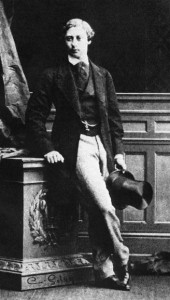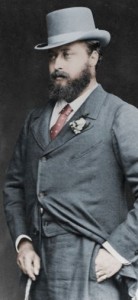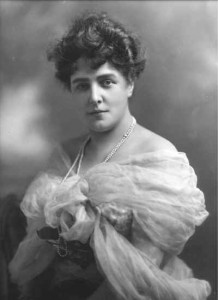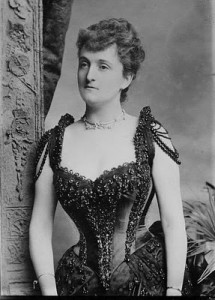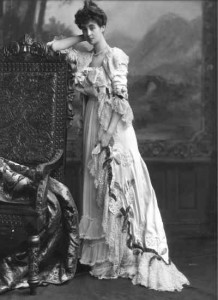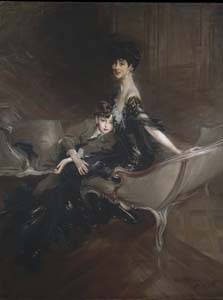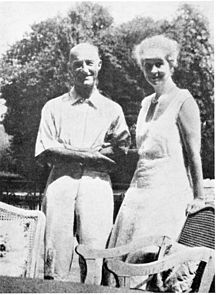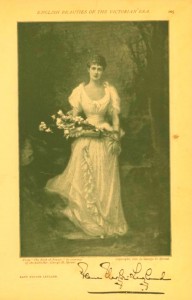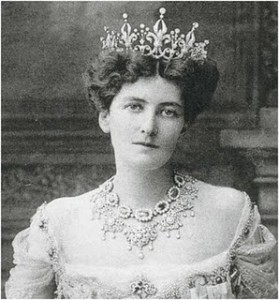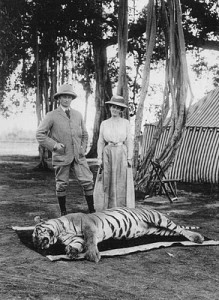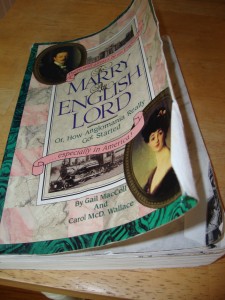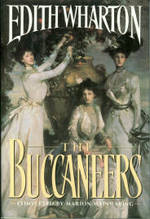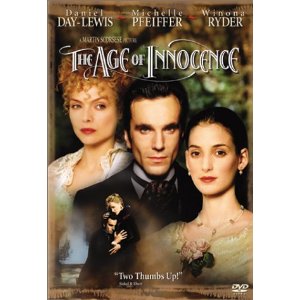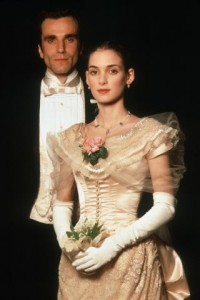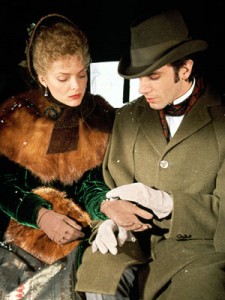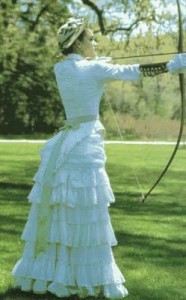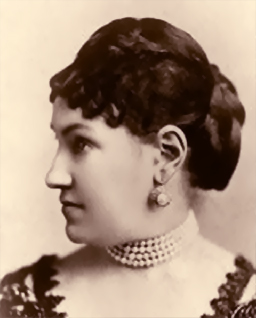Episode 9: Gilded Age Heiresses
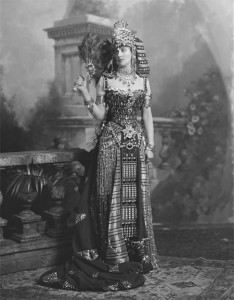 Next up in our discussion is Consuelo Yznaga.
She landed her title as Duchess of Manchester when she married Viscount Mandeville in 1876. This union really got things hopping in NYC after Consuelo’s childhood friend Alva Vanderbilt threw a ball in her honor. (Seriously, if you don’t know who Alva is or what happened at that ball, you simply MUST listen to the Mrs Astor podcast!) Alva was also inspired to get a title for her one and only daughter whom she had named after her childhood friend…Consuelo. (Yes, same one. How many Consuelos can there be in this story?)
Consuelo Vanderbilt was raised to become royalty. Alva saw to all her education, as well as overseeing the suitors who came sniffing around. Alva, wishing to draw attention away from the fact that she and Willliam K were divorcing, got things moving as only Alva could. Consuelo had, for a brief moment, developed a backbone and told Mommy Dearest that she was engaged to be married to someone Mom did not approve of. Alva manipulated that thought right out of her daughter’s head and in 1895 a tearful 18 year old Consuelo married of Charles Spencer- Churchill, the 9th Duke of Marlborough, becoming a Duchess.
Next up in our discussion is Consuelo Yznaga.
She landed her title as Duchess of Manchester when she married Viscount Mandeville in 1876. This union really got things hopping in NYC after Consuelo’s childhood friend Alva Vanderbilt threw a ball in her honor. (Seriously, if you don’t know who Alva is or what happened at that ball, you simply MUST listen to the Mrs Astor podcast!) Alva was also inspired to get a title for her one and only daughter whom she had named after her childhood friend…Consuelo. (Yes, same one. How many Consuelos can there be in this story?)
Consuelo Vanderbilt was raised to become royalty. Alva saw to all her education, as well as overseeing the suitors who came sniffing around. Alva, wishing to draw attention away from the fact that she and Willliam K were divorcing, got things moving as only Alva could. Consuelo had, for a brief moment, developed a backbone and told Mommy Dearest that she was engaged to be married to someone Mom did not approve of. Alva manipulated that thought right out of her daughter’s head and in 1895 a tearful 18 year old Consuelo married of Charles Spencer- Churchill, the 9th Duke of Marlborough, becoming a Duchess. 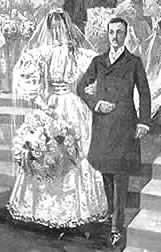
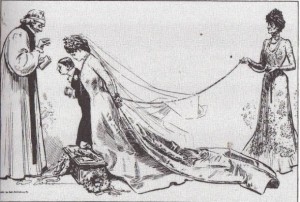
Satirical cartoon by Charles Dana Gibson. Whoever could that be? (Note the couple kneeling at Cupid’s Coffin)
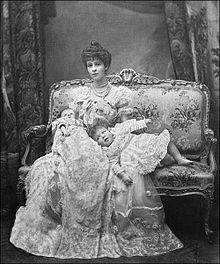
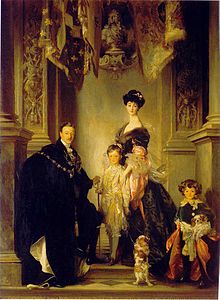
The fam. Note how the artist, Singer Sargent, posed Consuelo to appear as if she were standing on stairs to give her a reason for being taller than the Duke.
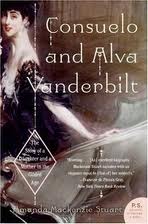 Since you are on a Consuelo bender, check out her book, The Glitter and the Gold.
Since you are on a Consuelo bender, check out her book, The Glitter and the Gold.
 Finally, after you get good and educated on all of these women of the Gilded Age, get your hands on Edith Wharton’s The Buccaneers. Wharton died before the book was finished, but 50 years later, a Wharton scholar named Marion Mainwaring finished the tale of three American women who marry British Nobility. ( Or you could watch the 1995 BBC miniseries,which is available on dvd).
As always, music for our podcast comes courtesy of Music Alley. Visit them at music.mevio.com.
Finally, after you get good and educated on all of these women of the Gilded Age, get your hands on Edith Wharton’s The Buccaneers. Wharton died before the book was finished, but 50 years later, a Wharton scholar named Marion Mainwaring finished the tale of three American women who marry British Nobility. ( Or you could watch the 1995 BBC miniseries,which is available on dvd).
As always, music for our podcast comes courtesy of Music Alley. Visit them at music.mevio.com.Age of Innocence “Moviecast”
The Age of Innocence:Vintage Movie Discussion
Yes, we are calling 1993 “vintage”. It’s based on the shoe scale, if you would purchase a pair of shoes from this year and call them ” vintage”, then we can use it for a movie from the same year.
From The History Chicks Dictionary: Vintage- Completely subjective word to describe anything that is too old to be new, but a real prize for someone. Maybe not you. Maybe not us. But someone will love it!
The discussion: The Age of Innocence, 1993 ,directed by Martin Scorsese starring Daniel Day Lewis, Michelle Pfeiffer and Winona Ryder is based on the Pulitzer prize winning novel by Edith Wharton. Since we are mid- Gilded Age series, what a great time to talk about this movie!
(Here is the link for more information about the language of flowers:
http://home.comcast.net/~bryant.katherine/flowers.html )
Of course there is more, and yes, the conversation is historically based- not just a review of an older, er, vintage flick by two vintage chicks.
As always, music for our podcast comes courtesy of Music Alley. Visit them at music.mevio.com.
Episode 8 – The Mrs. Astor
Episode 8 “The Mrs. Astor”
Caroline, who was often called Lina, was born in September 22, 1830 to a very prominent wealthy family. She was the youngest of 10 children, and very much the family pet.
Her father Abraham was not only well thought of in New York business, but he and his wife, Helen White Schermerhorn, were established in high society when Lina was born.
Caroline was, naturally, raised in that New York society. She enjoyed the life a life of privilege- doted on by nannies, servants, and tutors. We talk about her early life, and what proper bred young ladies learned, and their lives in New York, and Paris. And how academics took a backseat…waaay in the back.
Can’t talk about Caroline without a chat about the Gilded Age! The rapid economic and population growth had creation of a whole lot of social conflict. This period of time is called the Gilded Age because it looks golden, but looks are deceiving. Mark Twain and his co-writer Charles Dudley Warner, get credit for labeling the period in his book: The Gilded Age, a Tale of Today.
(Click here for more fabulous shownotes!)
